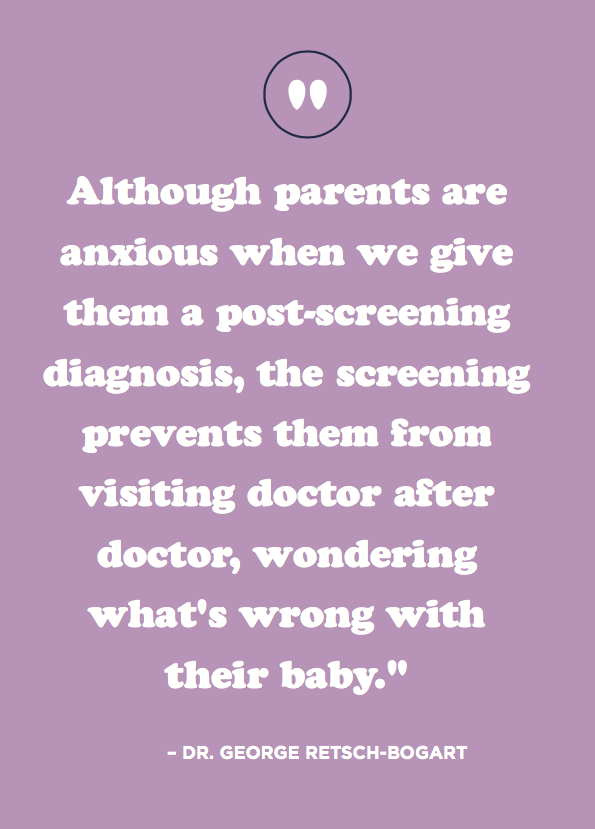Cystic fibrosis screening for newborns transforms young lives
December 1, 2016
As a young professor at the University of Wisconsin at Madison, Michael R. Kosorok, PhD, completed research that has had an impact upon the life of every baby born in the United States over the past decade.

Drs. Michael Kosorok (left) and George Retsch-Bogart review data on cystic fibrosis screening. (Photo by Brian Strickland)
Now the W.R. Kenan Jr. Distinguished Professor of biostatistics at the UNC Gillings School of Global Public Health, Kosorok was the second lead author on “Nutritional Benefits of Neonatal Screening for Cystic Fibrosis,” published Oct. 2, 1997, in The New England Journal of Medicine. The paper played a key role in the Centers for Disease Control and Prevention’s 2004 recommendation that states institute newborn screening for cystic fibrosis (CF), a progressive, genetic disease which is the second most common life-shortening, childhood-onset, inherited disorder in the United States.
In November 2003, the CDC and the Cystic Fibrosis Foundation co-sponsored a workshop to review benefits and risks associated with newborn screening for CF.
“The written minutes from the workshop make it clear that our paper was the key piece of evidence that pushed people over the edge to decide that screening would be beneficial,” says Kosorok. “Other evidence was important, but our paper was particularly influential because we were the only research group that used a controlled randomized trial which met the highest scientific standard.”
Kosorok and his colleagues demonstrated that newborn screening for CF led to long-term benefits – such as improved growth and, in one study, cognitive development – as a result of early nutritional treatment.
George Retsch-Bogart, MD, professor in the UNC School of Medicine and co-director of the UNC Cystic Fibrosis Therapeutics Development Center, says that identifying children with CF before they become symptomatic has had a profound impact on the lives of these patients and their families.
“Although parents are anxious when we give them a post-screening diagnosis,” Retsch-Bogart says, “the screening prevents them from visiting doctor after doctor, wondering what’s wrong with their baby.”
Newborn screening in the United States leads to a diagnosis of CF a median of one year earlier than does symptomatic detection.
“We are able to get the identified children into state-of-the-art care centers where we see them a minimum of every two months for the first year of life and then every three months thereafter,” says Retsch-Bogart. “This allows us to make sure these children have the best nutrition possible while monitoring and treating respiratory problems.”
Retsch-Bogart was a key player in influencing the North Carolina Department of Health and Human Services (DHHS) to add CF screening to its newborn testing panel. In 2005, a multidisciplinary group of health professionals approached the North Carolina Newborn Screening Advisory Committee, which makes recommendations to DHHS, to request the addition of the CF test.
“In 2008, budget approval was received for a little more than $1 million for the state to purchase testing equipment, hire personnel and make sure there was space in the state laboratory,” says Retsch-Bogart.
Newborn screening for CF began in North Carolina on April 13, 2009, nearly 12 years after the publication of Kosorok’s paper.
“Even if you have all the resources at your fingertips, there has to be a will among policy makers to make a change,” says Kosorok.
 Since its implementation, the screening test in North Carolina has identified between 30 and 34 newborns with CF each year. Retsch-Bogart says that the few diagnoses missed by the test are identified through clinical symptoms.
Since its implementation, the screening test in North Carolina has identified between 30 and 34 newborns with CF each year. Retsch-Bogart says that the few diagnoses missed by the test are identified through clinical symptoms.
“In the past, people dragged their feet on newborn screening for CF because there was no cure,” he says. “But in the last five to seven years, we have new therapies being scaled down from adults to children. We have breakthrough therapies for the fundamental defect, and there are now studies underway in children from early infancy to age two with a drug that targets the underlying cause of CF produced by mutations of the CF gene. As we get more of these therapies, we can start children, immediately after the diagnosis, on a therapy that is as close to a cure as we can imagine at this time.”
Kosorok is gratified that his work has led to policy change throughout the country but says his primary goal is to produce quality research.
“I was very fortunate because many people do excellent research but don’t see policy change,” he says. “Since you don’t have control over these things as a scientist, it’s important to keep doing the good research that is essential to making informed decisions.”
— Michele Lynn
Carolina Public Health is a publication of the University of North Carolina at Chapel Hill Gillings School of Global Public Health. To view previous issues, please visit sph.unc.edu/cph.
